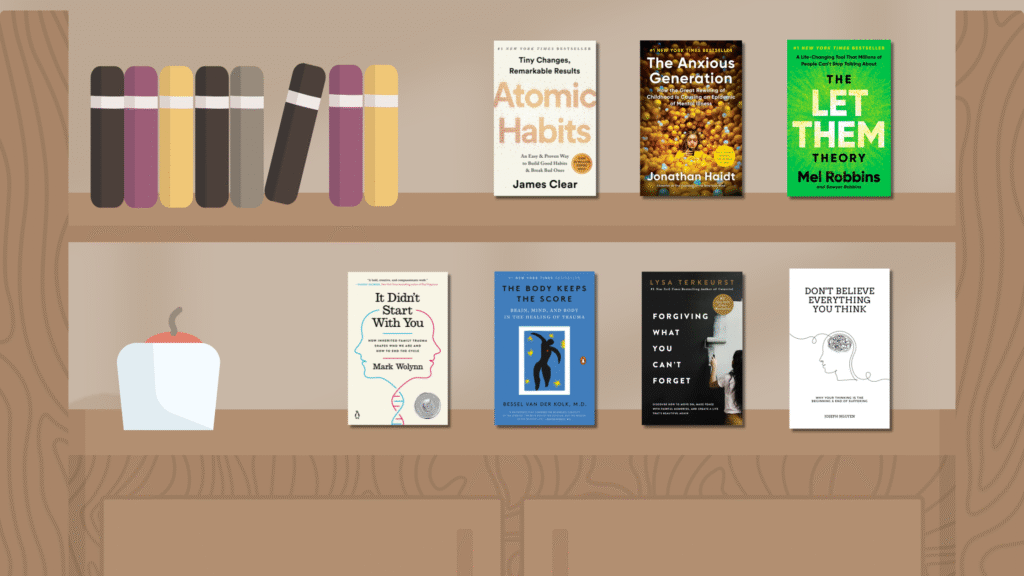
August is World Stress Management Month—a perfect reminder to slow down and prioritize mental wellness. In a world that often moves too fast, finding balance and coping with stress are essential for our overall health. Here at the Salina Public Library, we’re embracing this month with resources that promote relaxation, mindfulness, and self-care. Whether you’re dealing with work pressures, academic demands, or the everyday hustle, the library is a place where you can take a breath and reset.
Throughout the month, we’re offering a variety of stress-relief programs and materials designed for all ages. Join us for adult coloring nights, take a virtual tour of a national park, or browse our specially curated collection of books on mindfulness, yoga, emotional resilience, and mental health. Teens can unwind and explore their creative side with the Paint & Munch program, while younger readers can enjoy calming storytimes or attend Book Buddies, where they boost confidence by reading to a trained service dog. Our goal is to create a peaceful environment where everyone can explore healthy ways to manage stress.
You don’t have to wait for stress to build before seeking relief—small daily habits can make a big difference. Whether it’s checking out a book on deep breathing techniques, listening to soothing music from our media shelves, or simply finding a quiet nook to unplug, the library is here to support you and your well-being. Let’s use World Stress Management Month as a starting point for building a more balanced life, one mindful moment at a time.
Atomic Habits: An Easy & Proven Way to Build Good Habits & Break Bad Ones: Tiny Changes, Remarkable Results by James Clear
This book explores how small, consistent changes in behavior can lead to remarkable long-term results. It provides a practical framework for building good habits and breaking bad ones by focusing on identity, systems, and the power of incremental improvement.
The Anxious Generation: How the Great Rewiring of Childhood Is Causing an Epidemic of Mental Illness by Jonathan Haidt
The author’s main theory argues that the shift from “play‑based” to smartphone‑centric childhoods since around 2010 has fundamentally “rewired” youth development—triggering rapid increases in anxiety, depression, self‑harm, and loneliness, especially among teens. He contends that overprotective parenting in real life, coupled with under‑protected digital exposure, has left Gen Z vulnerable—and proposes solutions like delaying smartphones and social media, reinstating free play, and instituting phone‑free schools to rebuild resilience.
Organizing Solutions for People with ADHD: Tips and Tools to Help You Take Charge of Your Life and Get Organized by Susan C. Pinsky
A practical, step-by-step system tailored for ADHD brains, blending a streamlined organizing methodology with room-by-room project guides. It emphasizes decluttering to simplify life, creating easy-to-maintain storage solutions, and placing items where they’re most likely to be used to reduce overwhelm and build a sustainable structure.
It Didn’t Start with You: How Inherited Family Trauma Shapes Who We Are and How to End the Cycle by Mark Wolynn
This book reveals how unresolved trauma from our parents, grandparents, and even earlier ancestors can manifest in our own emotional and physical struggles—such as anxiety, depression, chronic pain, or phobias—even when the original events are forgotten or never consciously known. Through the practical Core Language Approach—using tools like genograms, diagnostic inventories, healing sentences, and visualization rituals—Wolynn empowers readers to uncover these hidden patterns and actively break the generational cycle to heal and reclaim wholeness.
The Let Them Theory: A Life-Changing Tool That Millions of People Can’t Stop Talking About by Mel Robbins & Sawyer Robbins
This offering promotes a simple yet powerful mantra—“Let Them”—as a tool to free yourself from the stress of trying to control others, shifting energy back to your own well-being and goals. Grounded in psychology, neuroscience, and relatable personal stories, the book teaches how releasing the need to manage people’s opinions and actions can reduce anxiety, strengthen relationships, and empower self-focus.
Forgiving What You Can’t Forget: Discover How to Move On, Make Peace with Painful Memories, and Create A Life That’s Beautiful Again by Lisa TerKuerst
A guide for readers through the painful journey of forgiving deep wounds—whether inflicted by betrayal, abuse, or abandonment—showing that forgiveness is a process of confronting hurt, understanding its impact, and choosing freedom over bitterness. Rooted in biblical insight and personal testimony, TerKeurst introduces a practical framework—“collecting, connecting, and correcting the dots”—to help individuals release resentment, set healthy boundaries, and cultivate peace even when offenders won’t apologize.
Breaking Through Depression: A Guide to the Next Generation of Promising Research and Revolutionary New Treatments by Philip William Gold, MD
This book reconceptualized depression as a neurodegenerative “stress response gone awry,” rooted in the complex interplay of genetic vulnerability, emotional memory, and brain-body biochemistry. Drawing on his decades of NIH research, the author highlights cutting‑edge interventions—like psilocybin, ketamine, low‑energy laser stimulation, genetically tailored antidepressants, and anti‑inflammatory and gene therapies—that aim not just to manage symptoms but to repair neural circuitry and restore resilience.
The Body Keeps the Score: Brain, Mind, and Body in the Healing of Trauma by Bessel A. Van der Kolk
A paradigm-shifting view that trauma is not just psychological—it physically alters brain structures and bodily systems, embedding memories in somatic patterns rather than verbal recall. Drawing on decades of clinical research, Van der Kolk advocates for integrative therapies—like EMDR, neurofeedback, yoga, and drama—that reconnect mind and body, promote neuroplastic healing, and help survivors reclaim agency over their lives.
Nothing Much Happens: Cozy and Calming Stories to Soothe Your Mind and Help You Sleep by Kathryn Nicolai
A gentle anthology of more than 50 short, seasonally themed vignettes set in a tranquil village—simple scenes like sharing tea, wandering through lilac-scented fields, or browsing a cozy bookstore. Drawing on Nicolai’s background in meditation and yoga, the book weaves in mindful practices, recipes, and illustrations to lull restless minds into relaxation and restful sleep.
Don’t Give Up, Don’t Give In: Lessons from an Extraordinary Life by Louis Zamperini & David Rensin
This book, completed just two days before his death at age 97, offers a powerful valedictory reflection on a life marked by extreme adversity, from Olympic glory to wartime survival, torture, and PTSD, all tempered by unwavering hope, faith, and forgiveness. In a series of concise, deeply personal essays, Zamperini distills his hard-earned lessons—such as perseverance, acceptance, and the healing power of forgiveness—into timeless guidance for facing life’s greatest challenges without surrendering.
Don’t Believe Everything You Think: Why Your Thinking Is The Beginning & End Of Suffering by Joseph Nguyen
Explores how most human suffering stems not from external events but from the thoughts we choose to believe. By recognizing the illusion of thought and connecting with our true inner self, we can break free from anxiety, self-doubt, and emotional pain.
The Mountain Is You: Transforming Self-Sabotage Into Self-Mastery by Brianna Wiest
Wiest reframes self-sabotage, not as a flaw, but as a subconscious survival mechanism—our internal mountain—that demands compassionate awareness and deliberate transformation. Through a blend of psychological insight and tangible tools like journaling, mindfulness, and identity reframing, Wiest guides readers to scale their inner barriers and step into lasting self-mastery.

About The Author: Sarah
Sarah is an information services assistant at the Salina Public Library. She graduated from Kansas State University with a B.A. in Journalism & Mass Communication and a Masters of Arts in Teaching. Sarah also works as a 5th grade teacher when not working at the library. In her down time, Sarah enjoys being with her dogs, doing home projects, watching sports (Go Wildcats!), and learning new things. Her favorite thing about the library is the people, the patrons and her coworkers make it a great place to be at.
More posts by Sarah